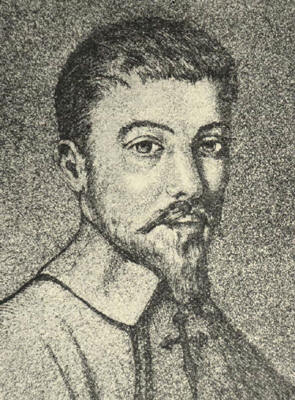Juan Pablo Bonet
Juan Pablo Bonet was a Spanish priest and pioneer in the education of the deaf. He is best known for writing the first well-known book dedicated to the education and language acquisition of deaf students, "Reducción de las letras y arte para enseñar a hablar a los mudos" (Simplification of the Letters and Art of Teaching Speech to the Mute), published in Madrid in 1620. Bonet's work marks a significant early effort in the formal education of the deaf, laying the groundwork for future developments in special education, linguistics, and phonetics.
Biography[edit | edit source]
Juan Pablo Bonet's early life details are sparse. He was born in the late 16th century in Spain. Bonet was not only a priest but also served as a secretary to Juan Fernández de Velasco, the 5th Duke of Frías and Constable of Castile. His interest in the education of the deaf was likely influenced by the work of Pedro Ponce de León, a Spanish Benedictine monk who is often credited with developing one of the first methods for teaching the deaf to speak and read.
Contributions to Deaf Education[edit | edit source]
Bonet's seminal work, "Reducción de las letras y arte para enseñar a hablar a los mudos," represents a significant milestone in the history of deaf education. In his book, Bonet proposed using a manual alphabet and sign language as tools for teaching speech and reading to the deaf. This was a revolutionary approach at the time, as it recognized the potential for deaf individuals to learn language and communicate effectively, despite their inability to hear.
Bonet's manual alphabet involved using hand signals to represent the different sounds of speech, which could then be used to teach deaf students how to articulate words and sentences. This method laid the foundation for what would later become known as manualism, a teaching philosophy that emphasizes the use of sign language and manual alphabets in deaf education.
Legacy[edit | edit source]
Juan Pablo Bonet's contributions to the field of deaf education cannot be overstated. His work paved the way for future educators and researchers, such as Charles-Michel de l'Épée and Thomas Hopkins Gallaudet, who would further develop the methods and philosophies of teaching language to the deaf. Bonet is remembered as a pioneer who recognized the importance of tailored educational approaches for deaf students, advocating for their ability to learn and communicate in a world designed for the hearing.
His book not only offered practical methods for teaching but also challenged prevailing attitudes towards deafness and disability, promoting a more inclusive and understanding perspective. Bonet's legacy is evident in the continued use and development of sign languages and manual alphabets around the world, as well as in the ongoing efforts to improve educational outcomes for deaf and hard-of-hearing students.
See Also[edit | edit source]
Navigation: Wellness - Encyclopedia - Health topics - Disease Index - Drugs - World Directory - Gray's Anatomy - Keto diet - Recipes
Search WikiMD
Ad.Tired of being Overweight? Try W8MD's physician weight loss program.
Semaglutide (Ozempic / Wegovy and Tirzepatide (Mounjaro / Zepbound) available.
Advertise on WikiMD
WikiMD is not a substitute for professional medical advice. See full disclaimer.
Credits:Most images are courtesy of Wikimedia commons, and templates Wikipedia, licensed under CC BY SA or similar.Contributors: Prab R. Tumpati, MD

